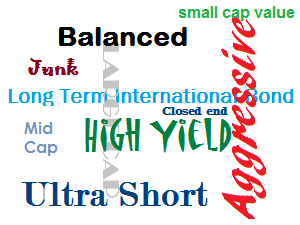 With the different types of mutual funds to choose from there’s a good chance you’ll come across one that you didn’t know about. It just might be a perfect fit for your portfolio…or not. You’ll never know unless you understand the basic types of mutual funds available.
With the different types of mutual funds to choose from there’s a good chance you’ll come across one that you didn’t know about. It just might be a perfect fit for your portfolio…or not. You’ll never know unless you understand the basic types of mutual funds available.
Mutual funds are broken down and categorized by the fund’s investment objectives. The name usually gives it away, but you can find this detailed in the fund’s prospectus. You should be reading the prospectus anyway before investing in a fund.
Nowadays, there is some semblance of structure to fund names. It’s like taxonomy in biology (only easier and less Latin), where the fund type or category is built into the name. You’ll find this mostly with index funds. When you see Large Cap Dividend Fund you know the asset class and investment style. It’s boring but it works.
It also makes it easier to build a portfolio when the fund names fit the categories in most asset allocation models. Continue Reading…
 Investors like ratios and the P/E ratio (Price/Earnings ratio) is the most popular. Some of the most successful value investors use the P/E ratio (along with other metrics) as a starting point in their research to find stocks that continuously beat the market. The reason is value investors tend to look for good quality stocks with lower than normal P/E ratios.
Investors like ratios and the P/E ratio (Price/Earnings ratio) is the most popular. Some of the most successful value investors use the P/E ratio (along with other metrics) as a starting point in their research to find stocks that continuously beat the market. The reason is value investors tend to look for good quality stocks with lower than normal P/E ratios. A number of tax code changes took effect at the start of this year. There were changes made to the
A number of tax code changes took effect at the start of this year. There were changes made to the